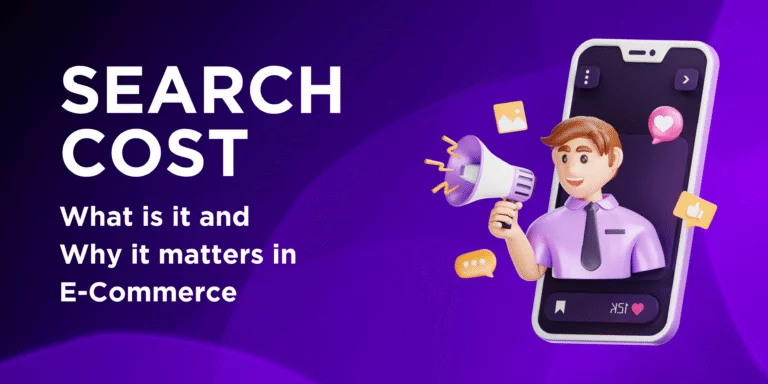When we talk about optimizing ecommerce stores, we often focus on pricing, product visuals, or page speed. But there’s another hidden friction that silently affects your conversions—search cost.
Search cost is the time, effort, and cognitive load a customer invests to find what they’re looking for. In other words: how hard is it for someone to find the right product on your site?
Let’s unpack what search cost really means, how it affects shopper behavior, and how reducing it can directly improve your revenue.
What Is Search Cost?
In economics and user experience design, search cost refers to the resources (like time, effort, and mental energy) a consumer spends to locate the product or information they want.

The higher the search cost, the more likely users are to bounce, give up, or leave without purchasing.
Examples of High Search Cost in Ecommerce
- A poorly organized product catalog with unclear categories
- Slow or inaccurate site search results
- Lack of filters to narrow down options
- No autocomplete or smart suggestions
- “No results” pages for simple queries
Every second a shopper spends figuring out your site is a second closer to abandonment.
Why Reducing Search Cost Is Critical
| Benefit | Impact |
|---|---|
| Lower Bounce Rates | Shoppers find what they need faster |
| Higher Conversions | Reduced friction = more completed purchases |
| Improved UX | Better navigation leads to better retention |
| Stronger Customer Loyalty | Easy experiences keep users coming back |
| Higher AOV | Easier discovery of related or complementary products |
In short, lower search cost = higher ROI from the same traffic.
Where Search Cost Shows Up in the User Journey
- Homepage & Navigation
If users can’t figure out where to go, search cost rises immediately. - Site Search
Slow, irrelevant, or typo-sensitive search results frustrate high-intent users. - Product Listing Pages
Endless scrolling without smart filters wastes time and increases decision fatigue. - No Results Pages
If a shopper gets a dead end, the perceived cost of trying again goes up—and they often don’t.
How to Reduce Search Cost (and Win More Conversions)

ExpertRec: A Smarter Way to Minimize Search Cost
One of the most effective ways to reduce search cost is to invest in a smarter product discovery experience.
ExpertRec helps by:
- Offering lightning-fast, AI-powered search
- Autocomplete with relevant suggestions
- Personalized search results based on user behavior
- Real-time filters for quick narrowing
- Zero-result recovery with fallback content
Less time searching = more time buying.
📌 Conclusion: Make It Easy or Risk Losing the Sale
In ecommerce, every added step is a chance for users to drop off. Search cost may be invisible, but its impact is not.
Lowering that cost isn’t just about better UX—it’s a direct path to higher conversions, stronger retention, and a more satisfying brand experience.
Frequently Asked Questions
What are bundle sales in ecommerce?
They involve selling multiple related products together as a set—often at a discounted or special price.
Do bundles increase revenue?
Yes. Bundling encourages shoppers to spend more in a single session and helps move inventory faster.
How can I display bundles on my site?
Use product page recommendations, popups, landing pages, or cart-based upsell options.
Are bundles only for discounts?
No. Many bundles are created for convenience or gifting—even without offering a discount.
Can ExpertRec help with bundle discovery?
Yes. ExpertRec uses AI-driven recommendations and smart search to surface frequently bought-together items and bundle-friendly options.




